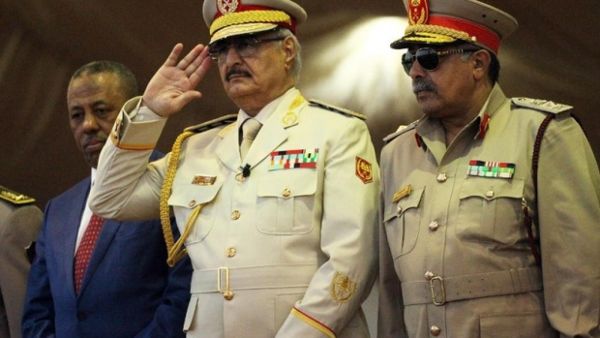Libya has been torn between unrest and civil war over its oil wealth since the 2011 uprising to overthrow the long-ruling strongman, Muammar Gaddafi when the country has been divided into eastern and western administrations linked to shifting military alliances.
{"preview_thumbnail":"https://cdn.flowplayer.com/6684a05f-6468-4ecd-87d5-a748773282a3/i/v-i-c…","video_id":"c96f8095-74b5-4d14-9683-668f13dc3b18","player_id":"8ca46225-42a2-4245-9c20-7850ae937431","provider":"flowplayer","video":"More Old Regime Seniors Arrested in Sudan"}
After years of fighting between the Libyan National Army (LNA) forces of eastern commander Khalifa Haftar against forces aligned with Prime Minister Fayez al-Serraji, the United Nations recognized the government of the capital city had failed after ordered his forces to move forward toward Tripoli to take control over it from the government.
Millions are on the brink to be displaced or killed, including around half a million children who are at risk as a result of this offensive.
Meanwhile, reactions to the offensive on Tripoli were varied between support of Haftar by his allies, including Egypt’s Sisi, France, Saudi Arabia, and UAE. On the other hand, Italy and Russia condemned Haftar’s offensive and backed the UN-recognized government and its right to keep control of the capital city.
On the internet as well, opinions were split between supporters of the victims and others supporting the Haftar forces.
Yet, there was an interesting pattern noticed on Twitter.
According to Libyan social media and data researcher, Khadeja Ramali, there was a noticeable number of Saudi accounts tweeting in support of Haftar and his forces since the beginning of April, when Tripoli offensive has begun.
Followed by Libya, USA, Qatar, Egypt and the UAE, Saudi Arabia, Saudi Arabia appeared to be the main source of Arabic-language tweets in support of Haftar in the period between April 1 to 13.
Update from April 1st until april13th % wise on keyword حفتر based on bio location.
— Khadeja Ramali (@k_ramali) April 13, 2019
Saudi
Libya
USA (not sure why this is- could be bots cant confirm)
Qatar
Egypt
UAE
Attribution-NonCommercial-NoDerivatives 4.0 International pic.twitter.com/uQ0S6rYjvh
Meanwhile, Ramali said that tweets from Qatar have actually appeared late and started getting active after half of last Sunday. This is believed to come after a late in hashtags launched by Saudi Arabia, all of which are being posted by electronic bots armies of the governments.
Qatar tweets only started getting active on a larger level by the second half of Sunday.
— Khadeja Ramali (@k_ramali) April 8, 2019
This fits a pattern of Qatar tweets having a delay, following late in hashtags initiated by Saudi/Emirates in other instances on twitter I’ve been told. https://t.co/mNjDlKjEHV
This is not the first time when Arab governments use their electronic bots in the wake of main political turmoils with the aim to affect the public opinion.
With the latest events taking place in Saudi Arabia; the Jamal Khashoggi killing and the Egyptian crackdown on freedoms on the internet, Arab Twitter users have been seeing a rise in the number of automated accounts flooding social media with hateful comments and threats against specific users who express opposition to governmental or royal figures.
This has led to a conclusion that Arab governments have in fact a hand through which it controls social media platforms.







